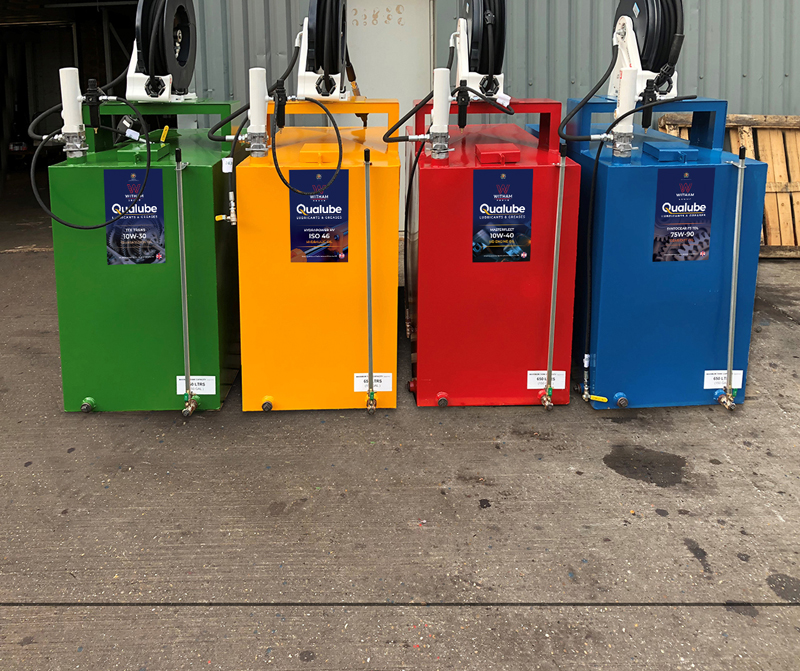Advantages of bulk storage solutions for oil

The Witham Group explains the advantages of its bulk storage solutions for oil, sharing a couple examples of some workshops it has helped transform.
Unfortunately, oils and lubricants are one of the most common reports of pollution, contributing to over 15 per cent of pollution incidents each year in the UK. It can harm people, plants and marine life, damage rivers, soil, destroy natural habitats and drinking water supplies, as well as ruining workshop and garage environments.
Oil storage regulations are governed by the control of pollution (oil storage) (England) Regulations 2001. This requires anyone in England who stores more than 200 litres of oil to provide secure containment facilities for tanks, drums, intermediate bulk containers (IBCs) and mobile bowsers. There are different regulations for England Scotland and Northern Ireland, so let’s take a closer look at oil storage for the workshop.
The basic principles
There are two main principals in storing lubricants, product integrity and environmental requirements. The basis is always to create an area which is safe, clean and appropriate. Basic rules include:
- Oil must be stored at least 10 metres away from inland or coastal waters, flood areas and 50 metres clear of a spring.
- Tanks should be on flood level or below ground level and must never be stored above roof level and kept away from areas that risk damage via impact, machinery and weather. The full legal requirements are outlined in detail in the oil storage regulations for businesses – GOV.UK website which covers storage of quantities of 201 litres and above. There are however different regulations that apply, depending on where you store your oil, how much you store and what you are using the oil for. If you choose not to comply with these regulations, you can be served an anti-pollution works notice and face prosecutions.
Different types of oil containers require careful storage
Lubricants are supplied in many ways, bulk, barrel, and various drums and small packs to meet the needs of a wide customer base. Bulk and barrels are generally supplied to commercial workshops and the other sizes to both the commercial and retail market. With the exception of bulk, the remaining sizes can all come in either plastic or metal containers depending on the supplier and also the type of product. Lubricants stored in a factory fresh sealed container will not normally degrade. Obviously, metal containers can be subject to corrosion over extended periods. In essence, the largest single container must be contained within 110 per cent of its volume.
Storage and movement of containers is guided by lifting at work regulations, so heavy containers are to be lifted correctly and with suitable and appropriate machinery.
The temperature of the surrounding environment can affect the lubricant, for example heat is a huge risk to oil, not only from a fire point of view, but also from a volumetric point of view. Oil volume will increase as the temperature rises so contained vessels need to be vented.
Once a container is opened it will come into contact with the environment and whilst lubricants often contain antioxidants they will start to oxidise when in contact with the atmosphere. If for example you were to leave a sample of hydraulic fluid in a glass jar open to the atmosphere for a period, you would see it darken in colour as this happens. Elevated temperature will, as will almost all reactions, increase the speed.
Is there a way to manage lubricant storage sustainably?
“Yes” explains Nigel Bottom of Witham Group. “Oil not only needs to be stored safely and properly because it’s the law, but it should also be stored to help with the environment and health and safety. Bulk Storage tanks are an ideal solution of metal tanks in your garage that removes the need for all plastic packaging. The simple colour coded tanks have sight gauges, taps or pumps and come labelled with each lubricant name and its application and are filled in bulk deliveries, saving the need for plastic drums and waste. This system is easy to use for all the workshop team, helps keep working spaces ship shape, avoids spills from containers and helps avoid important oil contamination, whilst helping the environment by using no packaging. With annual maintenance the longevity of bulk tanks will last over 50 years. This is a very sustainable process indeed as the defunct metal tank can then be simply recycled and the metal used again.”
This method of storage and use also helps tick all the regulation requirements for oil storage and keeps users and the workshop environment as safe as possible.
What’s the number one thing to consider when storing lubricants?
Nigel explains, “The best piece of advice we can give is to treat lubricants as if you were storing drinking water. Always avoid storing any products outside where water could penetrate the lid or seal. Many people assume the seals on barrels are watertight, they are generally not and are simply used as an anti-tamper method. If no other option but external storage is available always store barrels on their side. Moisture and dirt ingress are the two main factors. Moisture can be overcome by always keeping the bulk storage at as close to the same temperature as possible.
In addition to this, using air operated or electric transfer pumps and guns stops the contamination of oil in dirty transfer jugs. If jugs are used, they need to be kept in a clean environment also, upside down and empty when not in use. Bulk storage tanks should be fitted with return flaps to stop wastage of unused clean oil which can be returned to the bulk tank.
Optimising space
There are many storage solutions on the market, bulk tanks are excellent for larger volume products and bulk tanks can simply be raised off the workshop floor and downpipes fitted to both fill and empty. A simple process which will not impact the workshop floor space at all.
Bunded racks and trays are also available for smaller sizes. Try and avoid storing products for extended periods and just buy as much as your immediate needs require.
Benefits of bulk storage tanks:
- Keeps workshops clean and tidy.
- Helps the environment by using less container packaging.
- Creates more space in workshops and garages.
- Easy to distinguish different lubricants for various uses.
- Helps avoid oil spills and contamination.
- Long lasting storage solution – with good maintenance these will last up to 50 years.

Spitfire engineering
We are pleased to announce the successful installation of two new bulk storage tanks at Spitfire Engineering in Northamptonshire. A long-standing customer of our paint products, Spitfire Engineering sought to streamline their oil supply process by switching to bulk deliveries. After careful consideration of their specific requirements, we determined the ideal tank size and oil type to meet their needs. Our swift delivery from our Soham facility ensured a seamless transition. To aid inventory management, our lorry driver marked the tanks at the halfway point (200 litres), providing a clear visual indicator for reorder timing. The positive feedback from Spitfire Engineering underscores our commitment to providing exceptional customer service and tailored solutions. We look forward to continuing our strong partnership and supporting their future needs.
Sanders coaches
Witham Group is proud also to have supplied our oil to Sanders Coaches in Norfolk. For over three decades, it has been a reliable supplier of essential products and services to this well respected coach company. Our recent delivery of a quantity of 100 gallon, single skinned storage tanks to Sanders Coaches’ workshop further strengthens our commitment to supporting their operations. These tanks will provide a safe and efficient storage solution for their workshop needs.









